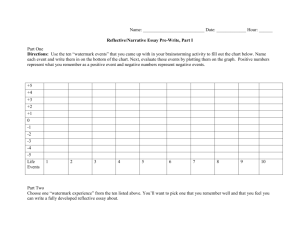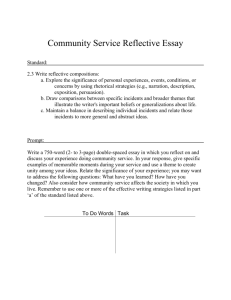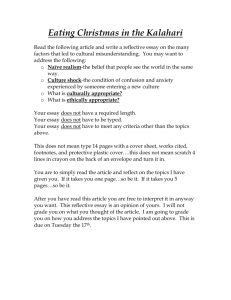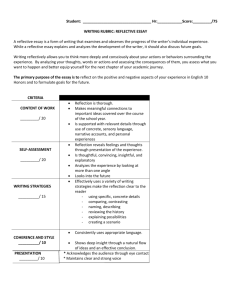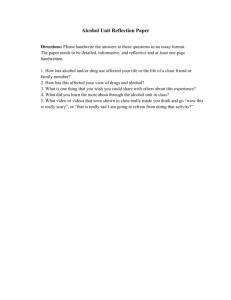Fall 2013 Standard Syllabus and Course Policies
advertisement
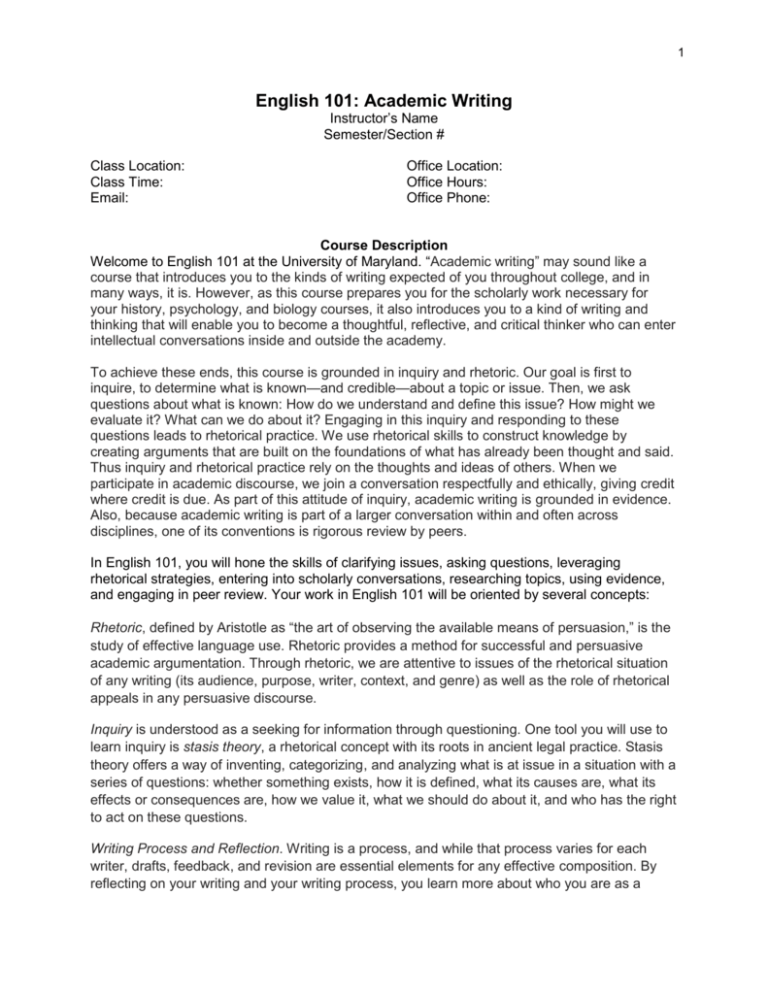
1 English 101: Academic Writing Instructor’s Name Semester/Section # Class Location: Class Time: Email: Office Location: Office Hours: Office Phone: Course Description Welcome to English 101 at the University of Maryland. “Academic writing” may sound like a course that introduces you to the kinds of writing expected of you throughout college, and in many ways, it is. However, as this course prepares you for the scholarly work necessary for your history, psychology, and biology courses, it also introduces you to a kind of writing and thinking that will enable you to become a thoughtful, reflective, and critical thinker who can enter intellectual conversations inside and outside the academy. To achieve these ends, this course is grounded in inquiry and rhetoric. Our goal is first to inquire, to determine what is known—and credible—about a topic or issue. Then, we ask questions about what is known: How do we understand and define this issue? How might we evaluate it? What can we do about it? Engaging in this inquiry and responding to these questions leads to rhetorical practice. We use rhetorical skills to construct knowledge by creating arguments that are built on the foundations of what has already been thought and said. Thus inquiry and rhetorical practice rely on the thoughts and ideas of others. When we participate in academic discourse, we join a conversation respectfully and ethically, giving credit where credit is due. As part of this attitude of inquiry, academic writing is grounded in evidence. Also, because academic writing is part of a larger conversation within and often across disciplines, one of its conventions is rigorous review by peers. In English 101, you will hone the skills of clarifying issues, asking questions, leveraging rhetorical strategies, entering into scholarly conversations, researching topics, using evidence, and engaging in peer review. Your work in English 101 will be oriented by several concepts: Rhetoric, defined by Aristotle as “the art of observing the available means of persuasion,” is the study of effective language use. Rhetoric provides a method for successful and persuasive academic argumentation. Through rhetoric, we are attentive to issues of the rhetorical situation of any writing (its audience, purpose, writer, context, and genre) as well as the role of rhetorical appeals in any persuasive discourse. Inquiry is understood as a seeking for information through questioning. One tool you will use to learn inquiry is stasis theory, a rhetorical concept with its roots in ancient legal practice. Stasis theory offers a way of inventing, categorizing, and analyzing what is at issue in a situation with a series of questions: whether something exists, how it is defined, what its causes are, what its effects or consequences are, how we value it, what we should do about it, and who has the right to act on these questions. Writing Process and Reflection. Writing is a process, and while that process varies for each writer, drafts, feedback, and revision are essential elements for any effective composition. By reflecting on your writing and your writing process, you learn more about who you are as a 2 writer and what academic writing is. Here, you gain the insights that enable you to assess your work and make productive changes towards improvement. Research and critical reading of academic sources invites you into the conversations of various disciplines. You will also learn the types of sources that are acceptable for academic papers and to the methods appropriate to integrate them into your writing and to document them. Learning Outcomes Upon completion of an Academic Writing course, you will be able to: Demonstrate understanding of writing as a series of tasks, including finding, evaluating, analyzing, and synthesizing appropriate sources, and as a process that involves composing, editing, and revising. Demonstrate critical reading and analytical skills, including understanding an argument's major assertions and assumptions, and how to evaluate its supporting evidence. Demonstrate facility with the fundamentals of persuasion, especially as they are adapted to a variety of special situations and audiences in academic writing. Demonstrate research skills, integrate your own ideas with those of others, and apply the conventions of attribution and citation correctly. Use Standard Written English and revise and edit your own writing for appropriateness. You will take responsibility for such features as format, syntax, grammar, punctuation, and spelling. Demonstrate an understanding of the connection between writing and thinking and use writing and reading for inquiry, learning, thinking, and communicating in an academic setting. Required Books Bullock, Richard, and Francine Weinberg. The Little Seagull Handbook. New York: Norton, 2011. Engagements with Rhetoric: A Path to Academic Writing. 4th ed. Boston: Pearson, 2011. Graff, Gerald, and Cathy Birkenstein. They Say/I Say: The Moves that Matter in Academic Writing. 2nd ed. New York: Norton, 2010. Silver, Nate. The Signal and the Noise. New York: Penguin, 2012. Course Policies and Procedures 1. Attendance Regular and punctual attendance. The writing you do in English 101 will be based on skills you will develop and hone in class; for that reason, your attendance and participation will have a direct effect on your work and, ultimately, your grades. If you miss class for any reason, it will be your responsibility to find out what you missed and how you can make up the work. Your participation grade and the quality of your work will suffer if you miss class. You are also expected to arrive on time. If you are late, you will disrupt class, and your participation grade will again suffer the consequences. Unexcused or “discretionary” absences. Discretionary absences should be viewed not as “free days” but as days you may need to deal with emergencies. You may miss two full weeks of class without substantial penalty—you will, however, lose participation and attendance points for those missed classes. For each unexcused absence after two weeks, your final grade will be lowered by one full letter grade. This means that if you have an A average but have two weeks of unexcused absences, you will earn a B in the course. 3 Excused absences. The University excuses absences for certain reasons (illness, representing the UMD at certain events, religious observance, and the death of an immediate family member), provided the cause of absence is appropriately documented (see below). Religious observances. The University's policy "Assignments and Attendance on Dates of Religious Observance" provides that students should not be penalized because of observances of their religious beliefs; students shall be given an opportunity, whenever feasible, to make up within a reasonable time any academic assignment that is missed because of individual participation in religious observances. Students are responsible for obtaining material missed during their absences. Furthermore, students have the responsibility to inform the instructor of any intended absences for religious observances in advance. The student should provide written notification to the professor within the first two weeks of the semester. The notification must identify the religious holiday(s) and the date(s). Documentation Requirements to Justify an Excused Absence for Illness. The University’s policy is to excuse class absences that result from a student’s own illness. The procedure and documentation required for an illness to be an excused absence differs depending on the frequency of the absence. For a single class meeting missed: If you miss only one class meeting for illness, you may submit a self-signed note to the instructor (that is, a note from a health care provider is not required for a single class missed, and the Health Center will not provide written excuses for a single absence). Each note must also contain an acknowledgment by the student that the information provided is true and correct; in this way, it must follow the Code of Student Conduct or may result in disciplinary action. Such documentation will NOT be honored as an excused absence if the absence coincides with a Major Scheduled Grading Event, which for ENGL 101 is a paper due date. If you know you will miss class, make an effort to alert your instructor and make arrangements in advance. Also, your documentation must be presented to the instructor upon returning to class. For Multiple but Non-Consecutive Meetings Missed: If you will miss more than one class meeting for a medical concern, but these will not be consecutive, you should provide documentation from a health care provider upon returning to class after the first of these absences that details future dates to be missed OR provide a note from a doctor that states specific dates missed (the note must state specific dates, rather than broadly name a time frame; that is, for example, documentation must say the student missed class on 9/12, 9/16 and 9/20 for a medical concern, rather than saying the student may have missed class repeatedly between 9/11-9/21). For Multiple Consecutive (more than one in a row) Meetings Missed OR an Absence Involving a Major Grading Event: If you will have a prolonged absence (meaning more than one absence for the same illness), you are required to provide written documentation of the illness from the Health Center or from an outside health care provider upon returning to class. In cases where written verification is provided, the Health Center or outside health care provider shall verify dates of treatment and indicate the time frame that the student was unable to meet academic responsibilities. No diagnostic information need be provided on this note. Absence due to participation in a University Event: If your absence is not due to an illness but is, rather, due to your participation in an official University event, you must provide 4 documentation for this absence prior to the absence; the documentation should be an official form from the University. 2. Participation You are expected to be prepared for class and to participate in class discussions, to be able to respond to questions posed to you, to have drafts when they are due, and to complete in-class writing activities. Your active participation will contribute to your final grade. We will discuss the definition of active participation in the first few class meetings. 3. Late Papers Papers are due on the date and time designated on the course syllabus. Late papers will be marked down one letter grade per day late, including weekends. If you must submit a late paper, you must also contact the instructor the day the paper is due, so that the instructor knows when to expect your paper and how you will submit it. 4. Draft Workshops Draft workshops enable you to develop two major writing skills that are integral to this course: 1) learning to be a critic of your own writing and the writing of others, and 2) learning how to revise your work given comments and questions from your peers. Your writing will improve by having others read and respond to it. We will have a draft workshop before each paper is due. During these sessions, you will exchange your paper with a peer (or peers) in the course and offer revision suggestions. Your peer review work will be part of your grade. On the day of a draft workshop, you will be required to have a complete draft of your paper. If you do not have a draft in class that day (this includes not having it in class because you are absent), your final grade for that paper will be reduced by a letter grade – that is, an A paper will be a B paper if you did not have your draft. 5. Paper Format The format for papers will vary, but unless otherwise indicated, standard format is doublespaced throughout (with no extra spaces between paragraphs), readable font (12 point, no italics except for titles or emphasis), one-inch margins on all sides, left justified, with your name, my name/the section number, and a telling title on the first page. When you have cited information, you should follow the MLA style guidelines appropriate for the topic or situation. Number all pages. The final draft of each assignment should be clearly labeled as such. Papers that do not follow these formatting guidelines will be penalized. 6. Paper Submission At the end of the semester, you must submit all graded copies of the major assignments. I will consult these materials when reviewing your final revision assignment and when considering your progress over the course of the semester. We will discuss this requirement in more detail as the semester progresses. 7. Office Hours Think of my office as an extension of the classroom and use my office hours to discuss any aspect of your writing or reading, as well as any questions you may have about class procedures or requirements. Come to office hours with questions about class discussions, writing techniques or strategies, writing projects you’re working on, ideas you wish to develop, 5 and so on. During my open office hours, you may stop in my office whenever you like. I am also happy to schedule another time to meet if my office hours conflict with your schedule. We will have one scheduled one-on-one conference in my office (see the course schedule for conference days). This meeting is mandatory. If you cannot attend our scheduled conference, please email me at least 2 hours before our planned time. If you miss our conference without emailing, I will count it as a class absence. 8. Writing Center All students should consider visiting the tutors at UMD’s Writing Center as a way to improve the overall quality of their writing. The writing center is for all student writers—including those who see themselves as strong writers. It is an excellent resource for you; please take advantage of it. The Writing Center offers both daytime and evening hours. Online tutoring is also available. You can make an appointment through the website below. Website: <http://english.umd.edu/academics/writingcenter> Address: 1205 Tawes Hall (301) 405-3785 writadmin@umd.edu 9. Cell Phone and Laptop Policy Please turn off your cell phone during class and put it in below your desktop. Texting during class will not be tolerated. You are welcome to use your laptop or tablet for class-related writing and activities. Checking Facebook or email during class will not be tolerated. Grading and Revision Grades The percentages of contribution to your final grade are as follows: Discussion board posts, class participation, draft workshops Summary Assignments #1 Summary Assignment #2 Annotated Bibliography Phase #1 and #2 Rhetorical Analysis Experience and Other Evidence Considering Another Side Final Position Paper Reflective Writing Assignments (1-5), Revision, Reflective Memo 10% 15%k 5% 5% 5% 10% 15% 15% 20% 15% Grading Standards are found in Engagements with Rhetoric. We will discuss specific grading criteria for each assignment. Revision Policy 6 Revision Policy for Assignment #1: So that you are able to gain a sense of the rigor of this course, for the first assignment, no essays will fail on the first attempt (except of course for lateness or plagiarism). If the essay would have failed, I will give it a W for “grade withheld” and ask you to revise the assignment. If the essay is not revised acceptably within a specified time, it will be recorded as an F. If the essay is revised in an acceptable manner, it will be granted as high as a C, but no higher. Revision is a major part of this course and a major element of strong writing practice. You will revise each of your papers after the scheduled draft workshop. I am also happy to meet with you before your paper is due to discuss your essay ideas and your drafts. In addition, your final assignment for this course asks you to revise an essay you’ve submitted and to which I’ve responded. Since I stress revision throughout the course and since there are so many opportunities for you to revise your work, there will not be possibilities for additional revisions to essays after they have been returned. Given this policy, please use me and your classmates as resources for essay revision and improvement before the submission deadlines. Academic Integrity Plagiarism, whether it is submitting someone else’s work as your own, submitting your own work completed for another class without my permission, or otherwise violating the University’s code of Academic Integrity, will not be tolerated. You are expected to understand the University’s policies regarding academic integrity. These policies can be found at the website of the Office of Student Conduct, www.shc.umd.edu. Please visit this website, click on the “students” link, and read the information carefully. Accommodations for Students with Disabilities If you have a registered disability that will require accommodation, please see me immediately. If you have a disability and have not yet registered it with Disability Support Services in the Shoemaker Building (4-7682 or 5-7683 TTY/TDD), you should do so immediately. 7 Course Assignments Summary: You will write two summaries that will count as separate assignments, each of approximately 300 words. Summary is an element of good critical reading, which is, in turn, the cornerstone of academic writing. Class preparation for this assignment will include an introduction to stasis theory as a way to inquire into what is at issue in a topic. With this assignment, we take the first step in learning many skills crucial to good academic writing, including inquiry, clarity and concision, effective and ethical use of sources, and the interconnection of reading and writing. Rhetorical Analysis: For this assignment, you will analyze a text by taking into consideration rhetorical appeals, style, organization, exigence, rhetorical situation, and intended audience. Your goal is to make an argument about the effectiveness of the text for the given audience. 4-5 pages. Experience and Other Evidence: In this first step of the extended research project, you will enter an academic conversation, but you will do so by identifying a topic for research that in some way connects to your own experience, very broadly defined. You will consider what is at issue with the topic and use the heuristic of stasis theory to inquire into your topic. Your goal is to explore how scholarly research and listening to the ideas of others can inform, expand, and complicate your experiential understanding of the topic. A library session will introduce you to the skills of finding and evaluating good sources. 4-5 pages. Annotated Bibliography Phases I and II: Over the course of the semester, you will compose two annotated bibliographies (phases I and II) that will enrich your thinking about your issue. Each annotation should include the following (1) cite the text of your choice in perfect MLA format; (2) summarize the text; (3) evaluate the fairness of the source by assessing how it compares to other sources on the subject, and (4) discuss how the text will help you gain a deeper sense of the issue and how the source will contribute your work on the essay in progress. Considering Another Side: You will identify a position that is different from the one you plan to take in your final paper (it need not be an opposing position, but should be a distinctly different position) and argue from a position of support of that argument. You should aim to use positive support, that is, you should confirm why this position is ethical or effective. 4-5 pages. Final Position Paper: This paper is the culmination of the research, thought, and revision about the topic selected earlier in the semester. Your goal is to compose an essay that offers the most persuasive arguments for this position, that refutes competing positions and alternatives, and that organizes your ideas effectively and efficiently. The final paper is directed to a specific, academic audience, and it should include a bibliography of approximately 20 sources. 8-10 pages. Reflective Writing Assignments (1-5); Reflective Memo and Revision: Reflection and revision are keys to one’s success as a writer. Through reflection and revision you are able to think critically about your writing process and the feedback you’ve received and then use that feedback to improve upon your writing. These smaller and larger assignments ask you to reflect on your writing throughout the semester and then, at the end of the term, revise an assignment of your choice based on your reflections. Here, you have the opportunity to demonstrate what you’ve learned over the course of the semester and to gain a unique picture of who you are as a writer. You will have the choice to revise the Rhetorical Analysis, Experience and Other 8 Evidence essay, or the Considering Another Side essay. Your reflective memo will discuss your substantive revisions to this essay, your understanding of academic writing, and your progress as a writer over the course of the semester. Reflective Writing Assignments 1 page; Reflective Memo 2 pages, single-spaced; Revision 4-5 pages. 9 Course Schedule EWR: Engagements with Rhetoric TSIS: They Say I Say LS: Little Seagull Handbook TSAN: The Signal and the Noise Day Week 1 Day 1: Sept 4 Day 2: Sept. 6 Week 2 Day 3: Sept. 9 Day 4: Sept 11 Day 5: Sept. 13 Week 3 Day 6: Sept. 16 Day 7: Sept. 18 Day 8: Sept 20 Week 4 Day 9: Sept. 23 Day 10: Sept. 25 Day 11: Session Objectives Introductions; Discuss Syllabus; Course Objectives Rhetoric—Canons and Stasis Theory; Audience; Academic Conversations; Summary Assignment Academic Conversations; Practice Summary with Daly; Identify criteria for summary assignment Exigence; Summarizing TSAN; Summary Strategies; Identify criteria for summary assignment; Coordination and subordination Draft Workshop; What is Revision?; Parallelism; Discuss Peer Review and Grading Criteria Reflections on Summary Assignment #1; Introduce Summary Assignment #2 and Assignment #3: Rhetorical Analysis; Choosing an Essay for Rhetorical Analysis Rhetorical Analysis; Choosing an essay for Rhetorical Analysis; Discuss Stasis; Appropriate and Precise Words Choosing an essay for Rhetorical Analysis; Discuss Worksheet; Discuss Summary Draft Workshop Assignment #2; Summary to Analysis; Appeals Analyze “Letter from Birmingham Jail”; Discuss Reflective Writing Assignment #2 Analyze “Letter from Reading Due EWR 3-10, 20-25; TSIS 1-15 Writing Due Discussion Board #1 TSIS 30-41; EWR, Daly, “Remarks”; 350-2 EWR 11-12;TSATN 146; LS 258-60 Discussion Board #2 LS 256-8 EWR 26-7; 401-5 Draft of Assignment #1: Summary Post, “Obama’s Speech at Howard” (available on Canvas) Final Draft of Summary #1 Due; Reflective Writing Assignment #1 Due Allitt’s “Should Undergraduates Specialize?” (available on Canvas); EWR 5179; 9-10; LS 262-6 Discussion Board #3 Rhetorical Analysis Worksheet (distributed via Canvas) EWR 104-108 Draft of Assignment #2: Summary EWR 385-397; 9-13 Final Draft of Summary #2 Due EWR 14-17; 104-108 Reflective Writing Assignment 10 Sept. 27 Week 5 Day 12: Sept. 30 Day 13: Oct. 2 Day 14: Oct. 4 Week 6 Day15: Oct. 7 Day 16: Oct. 9 Day 17: Oct. 11 Week 7 Day 17: Oct. 14 Day 18: Oct. 16 Day 19: Oct. 18 Week 8 Day 20: Oct. 21 Day 21: Oct. 23 Birmingham Jail”; Return to Appeals and Common Topics Analyze “Letter from Birmingham Jail”; Sentence Structure and Word Choice; Bring text for Rhetorical Analysis to class Draft Workshop Rhetorical Analysis; Comma & SemiColon Workshop (Ex. 1 EWR; p. 232) Introduce Experience and Other Evidence Essay; Finding a Topic and Audience; Discuss Reflective Writing Assignment #3 Experience and Other Evidence; Finding a Topic/Come to class with three topic possibilities; Working with Sources Library Day Experience and Other Evidence; Responding to Sources; Annotated Bibliography Experience and Other Evidence; Analyzing Arguments; Putting Sources in Dialogue (Bring sources to class); Choosing an Audience for Experience and Other Evidence essay Draft Workshop Experience and Other Evidence; Summary, Quoting, and Paraphrasing Introduce Considering Another Side essay; Stasis Theory Considering Another Side; Styling Paragraphs; Discuss Phase II Annotated Bibliography; Discuss Reflective Writing Assignment #4 Considering Another Side; Reading for the Conversation; Discuss Phase II Annotated Bibliography; Composing a Thesis Statement #2 Due LS 256-9; 262-6; 272-3 LS 282-8 Draft Workshop Rhetorical Analysis TSIS 195-7; EWR 9-10; LS 68-70 Final Draft of Rhetorical Analysis Due EWR 37-48; LS 71-80 Reflective Writing Assignment #3 Due LS 93-135 Interpolations essay; TSIS 55-77; LS 54-8 Interpolations essay; LS 80-2; EWR 20-23 Phase I Annotated Bibliography Due LS 82-92 Draft Workshop Experience and Other Evidence EWR 187-192 Final Draft of Experience and Other Evidence Essay Due Discussion Board #4 EWR 195-210; LS 2225 TSIS 145-55; 206-13; LS 7-8 Reflective Writing Assignment #4 Due 11 Day 22: Oct. 25 Considering Another Side; Choosing An Audience; Discuss Blackboard #5; **Bring Sources for Annotated Bibliography to Class** EWR 20-23 Discussion Board #5 Week 9 Day 23: Oct. 28 Day 24: Oct. 30 Day 25: Nov. 1 Week 10 Day 26: Nov. 4 Considering Another Side; **Bring Sources for Annotated Bibliography to Class** No Class-Conferences Interpolations essay Phase II Annotated Bibliography Due EWR 326-46; LS 273-7 Discussion Board #6 TSIS 105-120; LS 25-6 Draft Workshop Considering Another Side Interpolations essay; LS 250-5 Final Draft of Considering Another Side Due EWR 20-25; LS 7-8; 1622 Discussion Board #7 LS 16-22; Interpolations essay Reflective Writing Assignment #5 Due EWR 9-10; 217-220 Discussion Board #8 Day 27: Nov. 6 Day 28: Nov. 8 Week 11 Day 29: Nov. 11 Day 30: Nov. 13 Day 31: Nov. 15 Week 12 No Class-Conferences Considering Another Side; Integrating Research; Misplaced and Dangling Modifiers (EWR exercise 7 p. 237) Draft Workshop Considering Another Side; Focus on “Connecting the Parts” as well as Introductions, Conclusions; and Paragraph Development Introduce Final Position Paper; Bring to class your Experience and Other Evidence Paper and your Considering Another Side paper: How has your thinking changed on this issue? How did the previous assignments shape and change your thinking?; Pronoun Reference and Agreement (ex. 3 in EWR p. 233) Moving to the Final Position Paper; Choosing an Audience; Composing a Thesis Statement; Building Strong Supporting Claims/Building Strong Paragraphs Building Strong Supporting Claims/Building Strong Paragraphs Bring to class your bibliography of the twenty sources you’ll be using for your Final Position Paper; Stasis Theory; Refuting, Conceding, and Bridging Final Position Paper; Interpolations Essay; 12 Day 32: Nov. 18 Day 33: Nov. 20 Day 34: Nov. 22 Week 13 Day 35: Nov. 25 Distinguishing Your Voice TSIS 68-77; EWR 180-2 Final Position Paper; So What?; Inclusive Language Arrangement Strategies; Discuss Outlining Arrangement Strategies; Discuss Outlines; Transitions and Topic Sentences TSIS 92-101; LS 279-81 Day 36: Nov. 27 Day 37: Nov. 29 Week 14 Day 38: Dec. 2 Day 39: Dec. 4 Draft Workshop #1; Metacommentary Thanksgiving Break-No Classes Draft Workshop #2; Passive Voice (ex. 4 in EWR p. 234) TSIS 129-38 Draft Final Position Paper LS 243-4 Draft Final Position Paper Introduce Revision Assignment; Bring all Reflective Writing Assignments to class; Bring Rhetorical Analysis, Experience and Other Evidence, and Considering Another Side essays to class; Comma and Semi-Colon Review (ex. 13 in EWR p. 241) Revision Assignment & Reflective Memo; Identify the essay you plan to revise; What is a Reflective Memo?; Punctuation Review (ex. 12 in EWR p. 240-1) Revision Assignment & Reflective Memo Draft Workshop; Style/Grammar Review Revision Assignment & Reflective Memo Draft Workshop; Style/Grammar Review Last Day of Classes Re-read your Rhetorical Final Draft of Final Position Paper Due; Reflective Writing Analysis, Experience Assignment #6 and Other Evidence, and Considering Another Side essays, as well as your reflective writing assignments Day 40: Dec. 6 Week 15 Day 41: Dec. 9 Day 42: Dec. 11 Day 43: Dec. 13 EWR 213-16; Interpolations essay Interpolations essay; LS 23-25 Outline Final Position Paper Discussion Board #9 Draft Revision and Reflective Memo Draft Revision and Reflective Memo Final Draft of Revision Assignment and Reflective Memo Due

